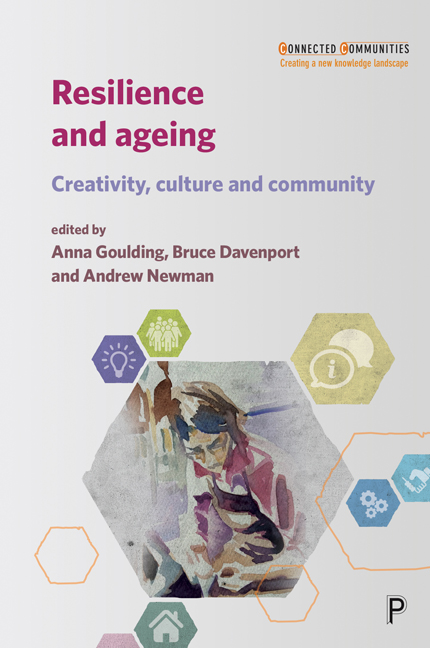Book contents
- Frontmatter
- Contents
- List of figures, tables and boxes
- Notes on contributors
- Series editors’ foreword
- Introduction
- one Setting the field: older people’s conceptualisation of resilience and its relationship to cultural engagement
- two Ages and Stages: creative participatory research with older people
- three Social connectivity and creative approaches to dementia care: the case of a poetry intervention
- four Narrative identity and resilience for people in later life with dementia living in care homes: the role of visual arts enrichment activities
- five After the earthquake: narratives of resilience, re-signification of fear and revitalisation of local identities in rural communities of Paredones, Chile
- six Integrating sense of place within new housing developments: a community-based participatory research approach
- seven Ageing in place: creativity and resilience in neighbourhoods
- eight Crafting resilience for later life
- nine Oral histories and lacemaking as strategies for resilience in women’s craft groups
- ten Objects of loss: resilience, continuity and learning in material culture relationships
- eleven Later-life gardening in a retirement community: sites of identity, resilience and creativity
- Index
Introduction
Published online by Cambridge University Press: 19 April 2022
- Frontmatter
- Contents
- List of figures, tables and boxes
- Notes on contributors
- Series editors’ foreword
- Introduction
- one Setting the field: older people’s conceptualisation of resilience and its relationship to cultural engagement
- two Ages and Stages: creative participatory research with older people
- three Social connectivity and creative approaches to dementia care: the case of a poetry intervention
- four Narrative identity and resilience for people in later life with dementia living in care homes: the role of visual arts enrichment activities
- five After the earthquake: narratives of resilience, re-signification of fear and revitalisation of local identities in rural communities of Paredones, Chile
- six Integrating sense of place within new housing developments: a community-based participatory research approach
- seven Ageing in place: creativity and resilience in neighbourhoods
- eight Crafting resilience for later life
- nine Oral histories and lacemaking as strategies for resilience in women’s craft groups
- ten Objects of loss: resilience, continuity and learning in material culture relationships
- eleven Later-life gardening in a retirement community: sites of identity, resilience and creativity
- Index
Summary
Introduction
This book is unique in bringing together researchers from multiple disciplines to address the relationship between taking part in different forms of creative and cultural practice and the development of resilience in older people. It makes a distinctive contribution to a strong body of research on the role of the arts in sustaining well-being (Walker, 2014; APPG, 2017) by articulating the role of culture in helping people to thrive. This edited collection arises from an UK Arts and Humanities Research Council's Connected Communities programme Followon Fund award, The Role of Creative Interventions in Fostering Connectivity and Resilience in Older People. Critical reflection on a range of projects from across the Connected Communities portfolio and beyond prompted innovative ways of thinking about the relationship between creative engagement and resilience. Through discussions during the series of workshops, it became clear that resilience was an integral yet distinct component of well-being and quality of life, which we wanted to investigate further. Workshop participants were invited to submit chapter proposals and a call was made via the Connected Communities programme mailing list and other social media channels. By examining the role of a broad range of international and UK-based projects, this book adopts a holistic cross-sector approach towards suggestions for facilitating active ageing and resilience.
The link between resilience and creativity may at first glance seem tenuous, as both terms come from such different disciplinary paradigms. Added to this, both terms are applied to multiple and contrasting contexts. Resilience can be used in relation to how communities cope with macro-level natural disasters such as earthquakes, right down to individual personality traits such as having a sense of humour helping people to navigate life. Similarly, creativity can be an original idea that carries value (Robinson, 1999), or associated with everyday problem solving. We view resilience as a combination of ‘both environmental and individual factors’ (Wild, Wiles and Allen, 2013, p 144) and as a ‘negotiated process’, rather than as a trait that some people are fortunate enough to possess (Wild et al, 2013, p 144). The distinction we have made is important, as the book aims to investigate what forms of cultural engagement make a difference for people in later life, with implications for the development of interventions.
- Type
- Chapter
- Information
- Resilience and AgeingCreativity, Culture and Community, pp. 1 - 18Publisher: Bristol University PressPrint publication year: 2018



